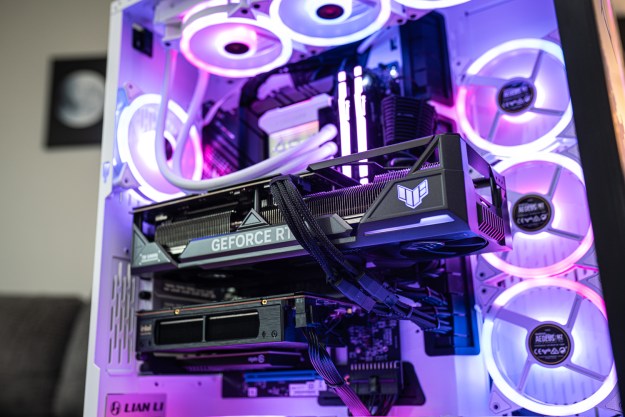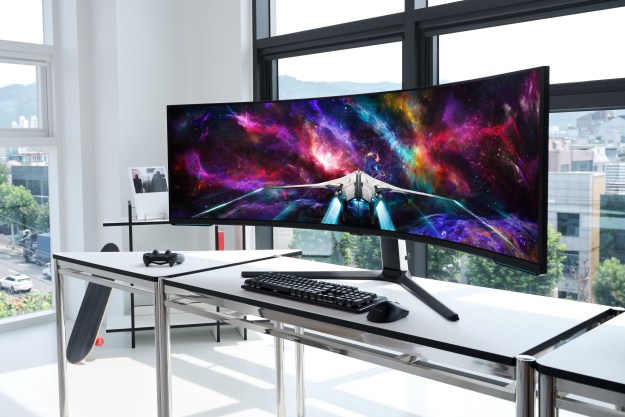“The Ximeta NetDisk is sure to change the future of external storage due to its easy setup and affordable price.”
- Ethernet and USB 2.0 support
- solid performance
- No Linux or Mac support
- no power button
Summary
The Ximeta NetDisk is sure to change the future of external storage due to its easy setup and affordable price. Our NetDisk 80GB drive performed well, and was quiet and reliable in all of our tests and we are very happy to see that Ximeta will be adding Linux and Mac support to the NetDisk product line in the near future. If you are looking for a portable hard drive and blazing speed is a determining factor, then the NetDisk might not be for you. But if you are looking for an easy and affordable way to add storage to your home or small business network then look no further than the Ximeta’s NetDisk.
Introduction
Small business owners and home networking enthusiasts usually are stuck with peer-to-peer or domain based networks in order to store, share and transfer files between networks and computer systems. This either meant that your computer has to be left on for others to access it in a peer-to-peer networking environment or you have to invest considerable time and money to get a domain controller and server setup for central storage, not to mention a server admin to administer it. Enter Ximeta’s NetDisk external hard drive. What separates the NetDisk drives apart from smaller plug and play based servers is that it is essentially a portable hard drive with both a USB 2.0 port and a 100Mbps Ethernet port and is recognized as a Network Attached Storage (NAS) drive. Ximeta is primarily targeting the small business user with this drive, but because the price is competitive at $199 for an 80GB/7200rpm unit, the NetDisk is a very attractive product for the home consumer market as well. Today we are reviewing the Ximeta NetDisk NDU10-80 model with an 80GB, 7200RPM internal hard drive which is ATA 33/66/100/133 compatible. Ximeta also offers 120GB and 160GB versions priced at $229.99 and $299 respectively.
Features and Design
The aesthetic appearance of the drive is very appealing due to the sleek aluminum housing. There is no FireWire support on the NetDisk drive, but there is a USB 2.0 and 100BaseT Ethernet ports located on the back of the drive. The great thing about this is that you can use the NetDisk drive as a personal external hard drive by connecting it directly to your computer or as a networked drive by connecting it to your network via a router, switch or a hub. Ximeta recommends that no more than 20 users use it while connected to a network for best performance.
Currently the NetDisk drive is only compatible with Microsoft Windows 2000 and XP operating systems, so if you are a Mac or Linux user, you are out of luck. This is due to the NetDisk’s software package and not any limitations associated with the drive. In order for a computer to see the NetDisk drive on the network using the Ethernet interface, you must have Ximeta’s software installed on that particular computer. There is a down side and an upside to this. The downside is that if you have a rather large network (corporate size for example) then implementing their software across the network would be a huge task for any IT staff. The upside to all of this is that there could be added security because anyone wanting access to the drive in the first place must have their software installed. Ximeta currently has Mac and Linux drivers in the works, so check their website often for updates.
The NetDisk drives are compatible with Wi-Fi LAN’s which means your wireless laptop will be able to see the NetDisk on your network, and are hot swappable using the USB 2.0 interface. The NetDisk drive measures 4.7″ inches wide, 8″ inches long and 1.4″ inches tall. The 80GB version features blue aluminum housing while the 120GB is white and the 160GB version is red.
On the hardware side of things if you have read our previous external hard drive reviews, there are a couple areas where the manufacturers could improve upon their external hard drives. Maxtor’s external personal storage drive for example is a fairly large unit, and despite their cooling efforts, it still puts out noticeable heat, not to mention noise and vibrations. We have seen this in a number of external hard drives ranging from Maxtor’s person storage drives to LaCie’s pocket drives. Unfortunately Ximeta has not been able to cool their NetDisk drive any more than the other manufacturers; however the NetDisk drive is incredibly quiet and considerably smaller in size than their competitors. We were unable to open the unit itself to see what brand hard drive the NetDisk uses, although the outside of the packaging says the sides easily slide open for upgradeability. We have heard that the NetDisk drives use Samsungs newer fluid bearing hard drives, but we do not know for certain.
For HTPC (home theater PC) users or those with a networked home, Ximeta’s NetDisk opens the door to unlimited possibilities. For the home theater PC application, imagine wirelessly stream music or video from the NetDisk drive to your system without worrying about excess noise. And if you need more storage space, simply add another NetDisk drive to the network. The one problem we see with a home network is the introduction of televisions and DVD players with an Ethernet connection because you have to install Ximeta’s software on the system accessing the NetDisk.
Performance
Testing:
In our tests the NetDisk performed admirably using the 100Mbps Ethernet interface. Because of the limitations of the Ethernet interface the NetDisk capped out at 11MB/sec in our read tests. Ximeta has said that a Gigabit Ethernet (1000Mbps) version will be created if the demand arises, however most small networks are still running at 100Mbps Ethernet anyways, so we are not concerned about this at this point in time. The overall Ethernet speed is not different than any other computer connected on your network. In our Sisoftware Sandra and Winbench 99 2.0 test, the Ximeta NetDisk trailed slightly behind the Maxtor 5000DV in all of our tests. For complete results and graphs, please click on the performance link above and below this review.


System Configurations:
Windows XP Pro; AMD Athlon 1700+; Abit AT7 Max 2 motherboard; 512MB DDR SDRAM 333MHz; Leadtek Geforce 4 MX video adapter.
Setup and Use
If you are installing the NetDisk drive to your personal computer using the USB2.0 interface, there is simply nothing to it. Plug it in and Windows XP or 2000 will recognize the unit as another hard drive. If you will be connecting the NetDisk drive to your network for everyone to use, there are instructions you will want to follow.
Make sure that the dip switches on the back of the drive are in the NDAS position so that users on your network can view the drive. As a network administrator you will want to install the NetDisk software on only the computers you want to have access to the drive.
What we like about the NetDisk drives is that you can set the drives into aggregate mode. This means that if you have 3 80GB NetDisk drives on your network, you can make it so they are recognized as a single 240GB drive instead of individually. This makes it incredibly easy to add more storage to your network because instead of adding each drive individually, you can simply add a new drive to the cluster when you need more space. The basic RAID functions of the NetDisk drive allow you to backup or mirror your data using the administration software. Unfortunately we only received one drive to review, so we were not able to test it in its RAID configuration. If you have experience doing this, we would appreciate it if you posted your thoughts either as a user review or in our forums for others to read.
Another great feature we liked about the NetDisk is that you can set the drive to either Read or Write permissions. So if you want users on your network to not have the ability to make changes to the information stored on the drive, you have that option. In essence, the NetDisk has a lot of the same fundamental features you would expect from a smaller all-in-one self contained server.
In our tests the NetDisk performed admirably using the 100Mbps Ethernet interface. Because of the limitations of the Ethernet interface the NetDisk capped out at 11MB/sec in our read tests. Ximeta has said that a Gigabit Ethernet (1000Mbps) version will be created if the demand arises, however most small networks are still running at 100Mbps Ethernet anyways, so we are not concerned about this at this point in time. The overall Ethernet speed is not different than any other computer connected on your network. In our Sisoftware Sandra and Winbench 99 2.0 test, the Ximeta NetDisk trailed slightly behind the Maxtor 5000DV in all of our tests. For complete results and graphs, please click on the performance link above and below this review.
Minor Polish
There are several small things that could be improved on the NetDisk product to increase its appeal. First of all, Linux and Mac compatibility probably should have been implemented before the product launch. It may be true that Microsoft’s Windows operating system is used in more home and small business environments, but it is not uncommon to see several non-Windows based computers in all but the smallest networks.
If the NetDisk is going to be sold to in the home consumer market it would have been a good idea to add an auto detect feature so that a person can move it from their computer system to the network without flipping a USB/Ethernet switch. It never hurts to make things dummy proof. A power button would also be a good idea to help maintain the drives longevity and reliability. And lastly, the tech support number provided by Ximeta has an office extension attached to it, and all our calls were forwarded to the same person’s voice mail. For all we know tech support could be a single person, certainly not what an IT administrator wants to find out in the middle of a crisis.
Conclusion
The Ximeta NetDisk is sure to change the future of external storage due to its easy setup and affordable price. Our NetDisk 80GB drive performed well, and was quiet and reliable in all of our tests and we are very happy to see that Ximeta will be adding Linux and Mac support to the NetDisk product line in the near future. If you are looking for a portable hard drive and blazing speed is a determining factor, then the NetDisk might not be for you. But if you are looking for an easy and affordable way to add storage to your home or small business network then look no further than the Ximeta’s NetDisk.



